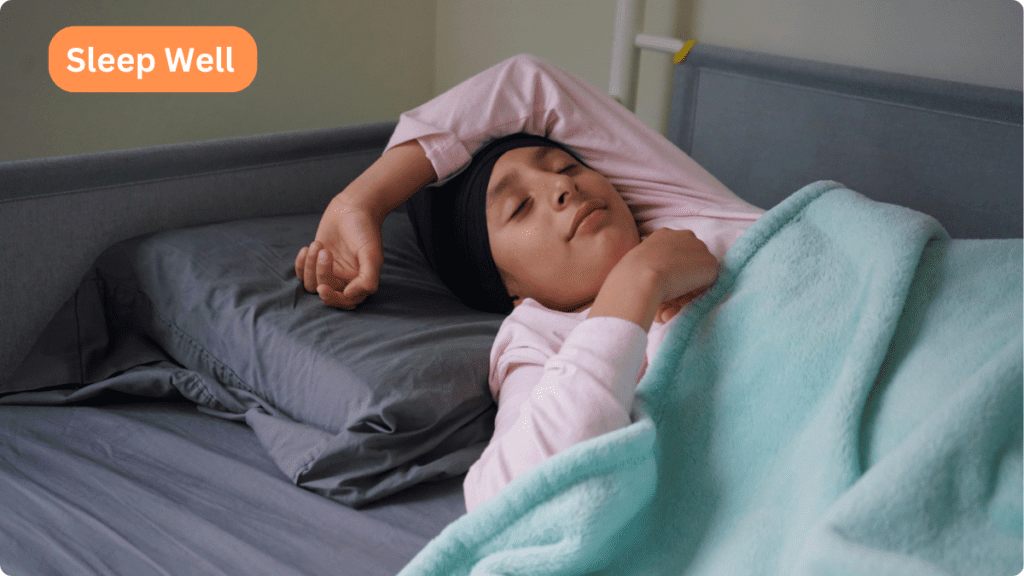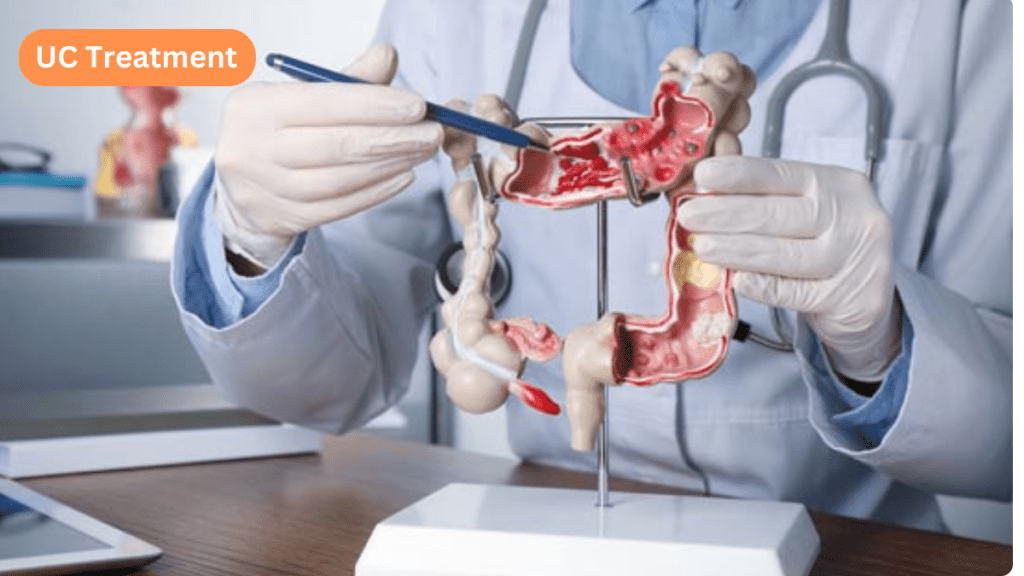Ulcerative colitis (UC) is a chronic inflammatory bowel disease (IBD) affecting the lining of the colon and rectum, which causes pain, ulcers, and inflammation. While drug therapy for ulcerative colitis plays a key role in managing the disease, life changes can make a big difference in the treatment outcomes of ulcerative colitis and maintain remission for longer periods. Modifying healthy lifestyles along with the treatment of UC can better control symptoms, prevent flare-ups, and maintain good health overall.
In this article, we discuss major lifestyle changes that accompany typical medicine for ulcerative colitis and accelerate the recovery process.
1. Follow a UC-Friendly Diet
Diet plays a significant role in managing ulcerative colitis treatment outcomes. Although there is no single diet for all, identifying and limiting foods that can cause flare-ups and pain is necessary to minimize them and circumvent them.
Best Foods for UC medical care:
- Low-fiber fruits and vegetables: Bananas, applesauce, and cooked carrots are gentle on the digestive system.
- Lean proteins: Skinless chicken, turkey, and fish provide nutrients without worsening inflammation.
- Probiotic foods: Yogurt, kefir, and fermented foods can repair the gut by establishing a balanced community of bacteria.
- Healthy fats: Olive oil and avocado support anti-inflammatory mechanisms in the body.
Avoid These Foods:
- High-fiber foods: Raw vegetables, popcorn, and whole grains can inflame the colon.
- Dairy products: Lactose intolerance is common among UC patients, so dairy products can be offenders.
- Spicy and fatty foods: These could make inflammation worse and trigger flare-ups.
Tip: Keep a food diary to track your diet and identify symptom-causing foods.
2. Drink Plenty of Water to Help with Recovery
Fluids are the key to successful treatment of UC. Dehydration will make symptoms worse, especially during flare-ups when diarrhea and fluid loss are common.
Tips for Hydration:
- Consume 8-10 glasses of water per day.
- Avoid coffee and other caffeine-containing beverages that are irritants to the colon.
- Use electrolyte drinks containing minerals during attacks to replenish lost minerals.
Hydration supports bowel regularity and enhances body healing mechanisms naturally, which is why it’s an essential element of ulcerative colitis therapy.
3. Handle Stress Properly
Stress aggravates the symptoms of UC, and so stress management is also included in UC medical care. Inflammation is triggered and the immune system is re-expressed when stress is high, making flare-ups more probable.
Stress-Reduction Techniques:
- Mindfulness and meditation: Regular use quiets the mind and reassures anxiety.
- Yoga and deep breathing: These promote relaxation and lower stress levels.
- Counseling or therapy: Cognitive-behavioral therapy (CBT) can be used to help patients learn coping skills.
Tip: Engage in activities or hobbies that are fun and can distract from the stress of having UC.
4. Sleep Well
Quality sleep is essential for the body to heal and respond well to medicine for ulcerative colitis. Poor sleep can lead to inflammation and worsen symptoms.
Better Sleep Tips:
- Establish a consistent sleep schedule by going to bed and waking up at the same time each day.
- Create a peaceful sleeping environment—keep the room cool, dark, and quiet.
- Avoid stimulants such as caffeine and screens at night.
Tip: Sleep 7-9 hours of high-quality sleep each night to assist UC in healing.

5. Do Gentle Exercise
Exercise is beneficial for overall health and can enhance UC medical care by reducing inflammation and enhancing mood. Yet vigorous exercise can exacerbate symptoms, so it’s necessary to do low-impact exercise.
Top UC Exercises:
- Walking or jogging lightly: Builds cardiovascular fitness without stressing the digestive system.
- Yoga and Pilates: Increases flexibility, reduces stress, and tones abdominal muscles.
- Swimming: Exercises the whole body with low joint and colon stress.
Tip: Listen to your body—if you are fatigued or uncomfortable, adjust your exercise program.
6. Adhere to Your Medication Schedule Closely
Even though lifestyle change is a good thing, adherence to prescribed medicine for ulcerative colitis is essential in controlling the disease. UC drugs suppress inflammation, prevent flare-up, and maintain remission.
Types of UC medical care Medicines:
- Aminosalicylates (5-ASAs): Suppress inflammation on the colon lining.
- Corticosteroids: Short-term use for relief of symptoms when the disease flares up.
- Immunomodulators: Suppress inflammation by inhibiting the immune system.
- Biologics: Target specific proteins involved in inflammation.
Tip: Collaborate with your healthcare provider to adjust your medicine regimen as needed.
7. Experiment with Probiotics and Supplements
Probiotics and some supplements can complement ulcerative colitis therapy by supporting a healthy gut microbiome and dampening inflammation.
Useful Supplements:
- Probiotics: Help replace beneficial bacteria in the gut and dampen inflammation.
- Omega-3 fatty acids: In fish oil, they have anti-inflammatory properties.
- Vitamin D: Supports immune function and can dampen flare-ups.
Tip: Always talk to your doctor before taking any supplements as part of your UC treatment plan.
8. Healthy Weight
Underweight or being overweight can negatively impact medicine for ulcerative colitis outcomes. A poor diet can weaken the immune system and make it harder for the body to handle inflammation.
Healthy Weight Tips:
- Eat balanced, regular meals throughout the day.
- Have nutrient-dense, easy-to-digest foods.
- See a nutritionist for the development of an individualized meal plan that will help manage UC.
9. Do Not Smoke and Do Not Drink
Smoking and excessive alcohol consumption may exacerbate the symptoms of UC and weaken the efficacy of UC treatment.
Why Avoid:
- Smoking: Aggravates inflammation and weakens the immune system.
- Alcohol: Inflames the colon and disrupts the natural equilibrium of the gut.
Tip: Find smoking-cessation classes and cut down on alcohol consumption to aid in recovery.
10. Build a Support System
UC can be emotionally draining, so having a good support system is crucial for emotional and mental well-being.

How to Build Support:
- Join support groups to connect with others who are experiencing the same.
- Talk to family and friends and how they can assist.
- Seek professional counseling when needed to cope with emotional stress.
Conclusion: Empowering Your Recovery with Lifestyle Changes
While medication for ulcerative colitis remains the first choice in treatment, adding lifestyle changes can significantly enhance recovery and long-term remission. Good diet, stress management, regular exercise, and adherence to UC treatment regimen are all essential components of effectively managing ulcerative colitis.
By taking healthy lifestyle decisions and working with your healthcare team, you can be the master of your UC journey and improve your quality of life. Remember, small but regular changes can make a huge difference in aiding your recovery and avoiding future flare-ups.
Ready to start? Start making these changes today and find a positive difference in your ulcerative colitis treatment experience!???


